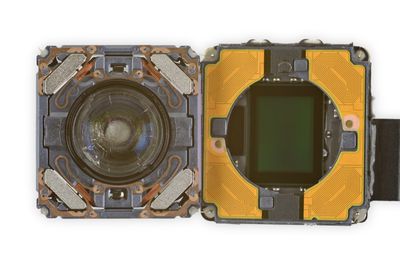iFixit has discovered that it is not possible to repair the iPhone 12's camera without access to Apple's proprietary, cloud-linked System Configuration app, raising questions over the repairability of the device.

iFixit says that it conducted exhaustive testing, compared notes with multiple repair technicians, and reviewed leaked Apple training documents to reach the conclusion that the iPhone 12's camera "is entirely unreliable when swapped between iPhones."
The matter was first addressed by Hugh Jeffreys on YouTube:
After detecting "extremely odd results" when conducting a camera repair, iFixit found that the iPhone 12 camera, when transferred to another iPhone 12, appears to work on launch, but fails in actual use. It reportedly refuses to switch to the ultrawide camera, responds only to certain camera modes, and occasionally becomes completely unresponsive.
iFixit also recalled that until now, cameras have "generally been easy" to swap between iPhones of the same model. Although similar, resolvable issues occurred with the iPhone 7 and iPhone 8's LCD screens and Taptic Engines, iFixit believes that there is now more cause for concern.
Apple's internal training guides for the iPhone 12, seen by iFixit, reportedly said that starting with the 12, authorized technicians will need to run Apple's proprietary, cloud-linked System Configuration app to fully repair cameras and screens.
Although it may theoretically be possible to complete camera and screen repairs without Apple's proprietary technology, iFixit is pessimistic about what the move means for independent repairs.
Apple, by design or neglect or both, is making it extremely hard to repair an iPhone without their blessing... It doesn't look good for independent repair. Apple is putting yet another question mark on a core component of the iPhone. Why? Why does a camera need to have its serial number authorized remotely by Apple just to let someone take pictures with their phone?
It is possible that Apple could address the iPhone 12's camera swap behavior with a future software update, but iFixit believes this is unlikely.
Taken together with the System Configuration document, and all the other bugs, tricks, and intentional lock-outs that Apple has put in the way of fully functioning iPhones, we take this as a sign that things won't get any better unless there is major change—from within, from customer demand, or from the law.
There is an argument to suggest that warning an iPhone owner about non-genuine parts, especially if the phone was bought used, is useful information, but iFixit notes that the camera module is not a security component.
It's a part prone to malfunction and damage, and can be harvested from otherwise-broken iPhones. Putting an authentication check on a simple camera swap poisons the iPhone repair and resale market. With no obvious benefit for iPhone buyers, it reeks of greed. Or worse: planned obsolescence.
Last week, iFixit scored the iPhone 12 a six out of ten for repairability. In response to this discovery about the camera module, iFixit is now actively reevaluating how its repairability scale scores iPhones going forward.























